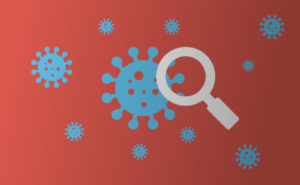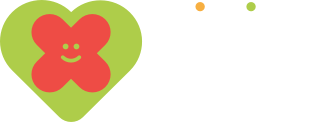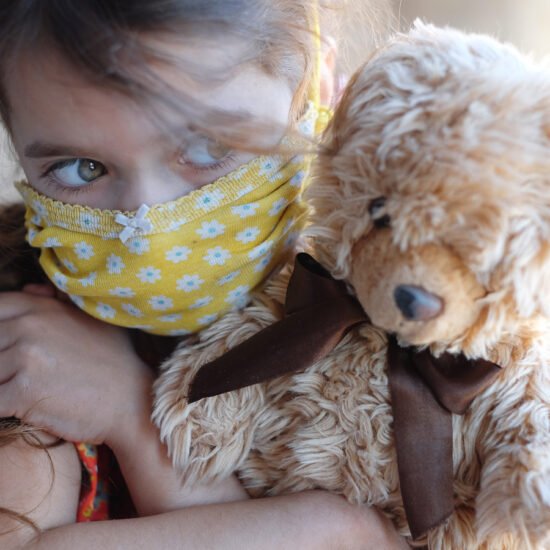COVID-19 – Prevention and control measures in the Child Care Centre
Code of Conduct and Hygiene Plan
Covid-19

PREVENTION AND CONTROL MEASURES AT THE Child Care Centre
COVID-19 is a disease caused by infection with the new Coronavirus. The disease is predominantly manifested by respiratory symptoms, namely fever, cough, and difficulty in breathing, and there may also be other symptoms, including odynophagia (sore throat) and generalised muscle pain.
Based on current scientific evidence, this virus is mainly transmitted through:
- Direct contact: dissemination of respiratory droplets, produced when an infected person coughs, sneezes, or speaks, which can be inhaled or rests in the mouth, nose, or eyes of people who are nearby (<<2 meters).
- Indirect contact: contact of the hands with a surface or object contaminated with SARS-CoV-2 and then with the mouth, nose, or eyes.
On March 11, 2020, COVID-19 was considered a Pandemic by the World Health Organization. Public Health measures have been implemented according to the various stages of preparation and response to epidemic situations, in order to reduce the transmission of the virus, provide adequate health care to all, and protect Public Health.
The Daycare and Nursery, of a socio-educational nature, welcome children up to the age of 6 and, due to the characteristics of these ages, translated into greater difficulty in adhering to preventive measures, there is potential for transmissibility, so prevention and control measures will have to be properly implemented.
PREPARATION FOR THE OPENING BACK UP OF THE Child Care Centre
The Child Care Centre will be properly prepared to address suspected cases of COVID-19, as well as to prevent and minimise the transmission of this disease, through the activation and updating of its Contingency Plans. These are prepared in accordance with the guidelines of the Competent Health Entities and include:
- The procedures to be adopted in the event of a suspected case of COVID-19;
- The establishment of an isolation area;
- The circuits for the suspected case to arrive and leave the isolation area;
- The updating of emergency contacts and information to parents;
- HR management in order to provide for replacements in the event of absenteeism;
- The training of all employees regarding the Contingency Plan and measures to prevent and control the transmission of COVID-19;
- Sanitary facilities with water, liquid soap with dosing device, and single-use paper wipes, to promote good hygiene practices;
- Daily waste management, without the need for special treatment;
- Disinfection and sanitation products for the proper procedures of the spaces;
- Protective equipment, such as masks, for all personnel;
- Alcohol-based solution dispenser for people to disinfect their hands at the entrance and exit of the centre and in the activity rooms.
OVERALL MEASURES
- Physical distance between children will be maximised when they are at tables, cribs and/or loungers;
- Children and employees will be organised in defined rooms (each employee must correspond to only one group) in order to avoid contact between people from different groups;
- Schedules and circuits will be organised in order to prevent bumping into other people;
- All employees will wear a surgical mask;
- All common indoor spaces of the Centre will be sanitised including door handles, handrails, buttons, and accessories in sanitary facilities, and disinfection is especially strict on surfaces that are up to the height of children;
- In the activity room, all toys, objects, and materials will be washed regularly;
- Upon arrival and departure from the daycare centre, children must be delivered/received individually by the father/mother, at the door of the establishment, avoiding their circulation within the space;
- Parents or visitors who imperatively have to enter the Centre will be checked for fever;
- Maintain ventilation and airing of the rooms and corridors of the building with the windows and/or doors of the rooms open, in order to allow for better air circulation within the space, not compromising the safety of children;
- The air conditioning equipment must not be switched on in air recirculation mode, with frequent maintenance of the filtration systems;
- Individual material required for each activity will be guaranteed;
- Cleaning and decontamination services will be reinforced before and after the nap;
- Access to the room limited only to professionals assigned to it;
- The walk to the eating area will be in phases so to limit children bumping into each other; alternatively, meals can be considered in the activity room;
- Before meals, there will be strict control of the washing of children’s hands;
- Places will be marked in order to ensure as much physical distance as possible between children;
- Adequate decontamination of the surfaces used between shift changes (tables, highchairs, among others) will be carried out.
- Children must change their shoes, having a pair exclusively to be worn at the Centre;
- Children should not bring toys or other objects from home into the room;
- The cribs, loungers, and cots will be guaranteed for each one, alternating the positions of the feet and heads of the children.
ACTION IN THE EVENT OF A SUSPECTED CASE
- Upon identification of a suspected case, the child must be sent to the isolation area, by the circuits defined in the Contingency Plan;
- Parents of the suspected case should be immediately contacted for child pick up and recommended to contact the Health Service;
- All parental guardians must be informed in case of a suspected case at the Centre;
- The Local Health Authority must be immediately informed of the suspected case, as well as its contacts, in order to facilitate the application of Public Health measures to close contacts.
- The cleaning and disinfection of the surfaces most used by the suspected case and the isolation area must be reinforced;
The waste produced by the suspected case must be packed in a resistant double plastic bag, closed, tightened, preferably with an adhesive/tie and must be placed in collective waste containers after 24 hours (never in ecopoints).


